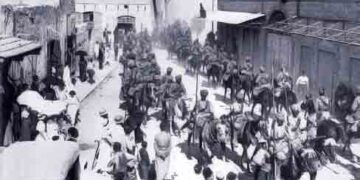 The origins of the Indian Armed Forces can be traced back to European powers which included the French, Dutch and Portuguese in addition to the British in Indian subcontinent. Their arrival changed India in many ways. After many major and minor wars between the Europeans, it was the East India Company that came to preside over the destiny of India.
The origins of the Indian Armed Forces can be traced back to European powers which included the French, Dutch and Portuguese in addition to the British in Indian subcontinent. Their arrival changed India in many ways. After many major and minor wars between the Europeans, it was the East India Company that came to preside over the destiny of India.
The era of the British Indian Army began after the First Battle of Plassey in 1757 which was the first military conflict between an Indian ruler, led by Nawab Siraj-ud-Daulah and the Company’s Army led by Robert Clive. They were traders until then.
Traders turned rulers
Having successfully subdued what was then the world’s richest province, the Company’s Army brought under its jurisdiction large parts of India. For this, they recruited Indians from all religions, castes and sects paid for from the company’s profits and war bounties.
It took Indians nearly 100 years to challenge the British rule. The immediate cause for the outrage that sparked the rebellion in 1857 came from unsubstantiated rumours that the cartridges issued to the soldiers had fat from cows and pigs, both of which were taboo for different segments of Indian soldiers. After the revolt was suppressed in 1858, the British Crown took over direct rule of India.
Enters the Crown
The Company’s Army units were merged with the British Army units, many of which like the Hodson and Skinners Horse exist till date among many others. The might and power displayed by the British Army inspired many Indian rulers to modernise as per European standards. This modernisation as well as exposure to various wars and campaigns triggered a new era of awakening in the Indians.
Over 153 Indians earned the Victoria Cross, with innumerable exposures to campaigns in Africa, Europe, Asia and other regions. The returning soldiers brought home an awakening that played a major role in the independence of India.
Battle of Haifa
It is important to know some of the decisive events that changed the course of history and India’s destiny. The Battle of Haifa was an epochal event fought on the slopes of Mount Carmel by Indian troops led by Indian officers on September 23, 1918. Indian troops had to be sent there because no British contingents were available in the Mediterranean theatre to rescue Abdul Baha, a prophet of the Baha’i faith, from the Ottomans, who were planning on crucifying him.
Thus for the first time Indian horsemen of the Jodhpur, Mysore and Hyderabad State forces, led by Indians armed with just swords and lances, were hurled into action. They defeated over thousand well entrenched Austrian and Turkish men armed with modern rifles, machine guns and artillery guns.
Role in world history
The outcome of the battle influenced history in two ways. First, it hastened the end of World War I by opening up the Port of Haifa through which reinforcements were sent in to West Asia. Second, the display of exceptional heroism and competence by Indian troops challenged the prevailing narrative that Indian soldiers performed only under British officers and that Indians lacked the leadership qualities to make good officers. This pivotal battle allowed for opening up of Kings Commission for Indians and their entry to Sandhurst.
The Prince of Wales Royal Indian Military College was founded in1922 at Dehradun to prepare suitable applicants for entry into Sandhurst. As a result, twenty five years later, by 1947 there was a battle-hardened military, officered by highly competent Indians.
Therefore, when the Bombay uprising of the Naval ratings took place in 1946 and started spreading across the country, Field Marshal Lord Wavell informed the British Prime Minister that there was no way that the British could hold on to India.
Independence at last
World War II had already decimated Britain’s finest men as well as material capacities. Britain reeled under acute shortages and rationing. Under those circumstances any further delay of the handing over of power would have been disastrous for the British. It is this thought that probably hastened the date of independence from August 1948 to August 1947.
What the Indian Independence achieved was that it opened the flood gates of independence to all the colonies bringing to an end the Age of Imperialism. Upon Independence, India graciously agreed to be part of the British Commonwealth.
India’s presence in the Commonwealth is what ensured its relevance. The future of India-Britain relationship is bright and full of possibilities despite the memories of the colonial history appropriately summed up in the inscription on the South Asian Memorial Gates which says that “Our future is greater than our past”.

















Nicely captured the gallant history of our army.
Rest all is fine but no one would agree to your colonial prejudiced comment that “India’s presence in the Commonwealth ensured it’s relevance ” India existed when there was no name of British and it shall continue to have relevance till ages come
Wonderful read & a great insight into the evolution of the Indian Army. My compliments to Col dpk Pillay
Informative & Interesting article thank you for sharing,DPK.
Well written and a good read.
Very informative.
The importance of ethos, traditions and systems practiced in the Indian Army would be better understood once our national leaders adopt and accept subscription to them by their ilk.
Till then, they continue to favour lesser importance upon them.
Very well written in simple language more in few words.
Sir you have mentioned about the returning successful army officers had a important role to play in our freedom struggle.
Could you please tell us more about it
And also some information about the rescue of Abdul Baha from the Ottomans